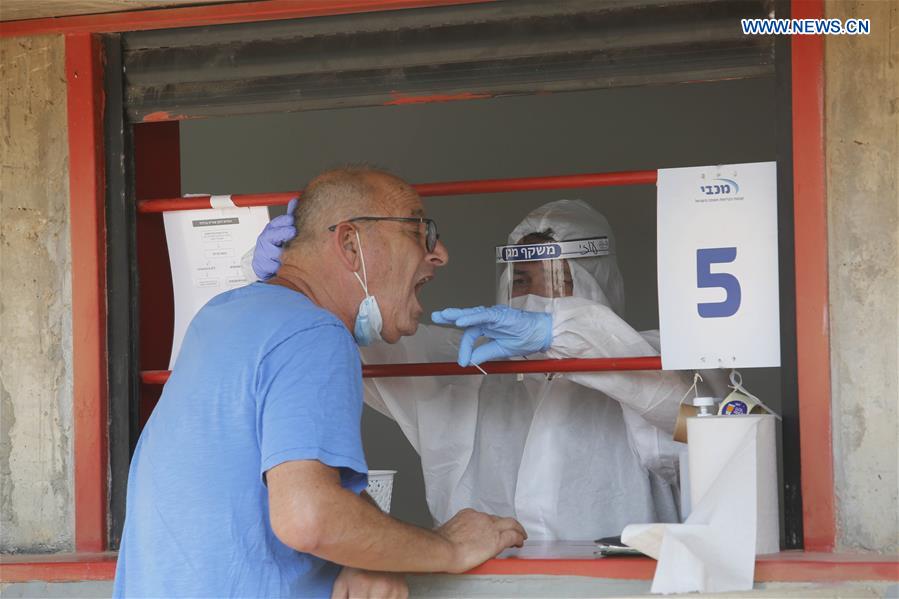
A medical worker takes a sample from a man for COVID-19 test in the central Israel city of Rishon Letsiyon on Sept. 6, 2020. The death toll in Israel over the COVID-19 surpassed 1,000 on the weekend, and the country also has one of the highest daily infection rates per capita in the world. (Photo by Gil Cohen Magen/Xinhua)
by Keren Setton
JERUSALEM, Sept. 7 (Xinhua) -- The death toll in Israel over the COVID-19 surpassed 1,000 on the weekend, and the country also has one of the highest daily infection rates per capita in the world.
On Sunday, Israel's coronavirus cabinet decided that a list of forty cities with high infection rates will be under a uniform night curfew starting Monday night. Schools will be closed and only small gatherings are permitted in those cities.
The localized curfews are part of the "traffic light" plan adopted by the cabinet, which is intended to curb the spread of the virus with a differential approach that allows areas with a lower infection rate to live with fewer restrictions. "Red cities" will be the first to have strict measures enforced upon them.
There were only tens of daily cases in May. The government was praised for its handling of the health crisis in the spring, and the botched economic response led to public pressure to re-open the economy. Israel re-opened with virtually no restrictions and the number of cases began to rise rapidly.
The battle against the virus has hit a lot of obstacles along the way. One of the biggest challenges is the political in-fighting which has marred the decision-making process.
The contentious localized quarantines will see mainly in Jewish ultra-orthodox and Arab cities under curfew, raising calls of discrimination. The ultra-orthodox Jewish parties, which are part of the coalition government, have consistently voted against measures that target only their communities, demanding similar treatment for other populations.
There are increasing calls for a nation-wide quarantine, while leading government and health officials say they are taking all the steps in order to avoid this. When the pandemic broke out in March, the government was quick to shut down borders and impose stringent lockdown measures. The policy was lauded as a success. However, as the economic ramifications emerged and unemployment sky-rocketed, there was pressure to lift all measures.
"In the first wave, we were very decisive. In the second wave, we caved into public pressure," said Yuval Steinitz, Israel's Energy Minister, in a radio interview early Sunday.
The experts in the country are divided. Some believe the localized approach is no longer a relevant tool as the spread of the virus spans all over the country. Only about a third of newly diagnosed cases come from so called "red cities," meaning the majority of new cases are fanned out, making it difficult to reign in the virus.
"I do not see how the numbers will be reduced, it is highly likely Israel will go into lockdown," said Cyrille Cohen, vice dean of the Mina and Everard Goodman Faculty of Life Sciences at Bar-Ilan University. "The 'traffic light' plan will not be fruitful in a timely manner, it will just serve as a Band-Aid."
The mortality rate in Israel has remained relatively low for various reasons, but this piece of good news has also had a negative effect on public attitude which is largely lax. Large gatherings are held despite forbidden regulations and many people do not wear masks as the law mandates. This also has several experts still championing the localized approach.
"We need to find local solutions on how to live with the virus while reducing morbidity," said Prof. Hagai Levine, an epidemiologist from the Hebrew University and chairman of the Israel Association of Public Health Physicians.
"Lockdown is only a temporary measure ... but if you don't change public behavior, you will end up back at the same point after the closure," Levine told Xinhua.
Another major challenge Israel is facing is that the leadership has failed to rally the public in face of the pandemic, due to the inconsistent policies and lack of personal example.
"The public needs to be told the meaning of not imposing a lockdown at this point," said Cohen, adding "the people have already been hurt from the first lockdown."
"We are not seeing a change in public behavior because of the lack of the trust, and this is why we are missing the mark," said Levine, "We still have not made the changes necessary to deal with this pandemic, and we still have time to fix this." Enditem



